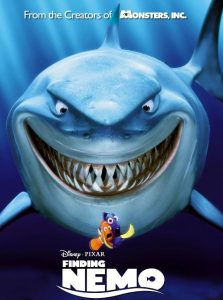
First, let’s dispense with the obvious: I realize I had no business spending a Friday night watching a Disney film with a bunch of unruly children, but I can honestly say that for what the film was trying to be, it was pretty good. Even charming. No, I would never place Finding Nemo on a list of the greatest films I have ever seen (or have even seen this year), but I will admit to being entertained and impressed by the brilliant detail of the film. And, thankfully, there were no cheesy songs to interrupt the flow, even if the story did get a bit sentimental at times. Still, given the fact that it was a cartoon (although with Pixar, the stakes are raised quite a bit), it was surprisingly mature and held definite appeal for those not prone to playing with their own feces.
The plot is, of course, as old as time and not at all taxing: Marlin, a fish who happens to be a single dad, searches for his son, Nemo, who was stolen by an Australian dentist who wanted the fish for his office aquarium. Along the way, Marlin encounters a blue fish with short-term memory problems, an old surfer-dude turtle, several sharks enrolled in an AA-style group that directs them to stop eating fish, and dozens of beautifully rendered sea creatures with distinct and memorable personalities. It speaks to the charm of the film that the animals are sympathetic while the humans are grotesque, selfish, irresponsible, and lacking in virtue.
Any film, especially one aimed at children, that has no love for human beings has, at the very least, my approval. There are adventures with whales, near-misses with jellyfish, escape attempts, and rousing, last-minute heroics. And, being a Disney film, there are assorted Life Lessons — being true to yourself, overcoming hardships and physical handicaps, trusting your parents, and letting your children take risks and make mistakes as they grow up. Still, despite the undeniable need of all modern cartoons to impart wisdom and moral instruction, Finding Nemo wasn’t as preachy as it could have been. Overall, most children will be too busy quoting their favorite lines or making assorted animal noises to care about what’s “good” for them.
And, while it was harmless to take a break from more sophisticated fare, I was shocked to encounter one of the most frightening patrons in my moviegoing life. I expect young children to scream and cheer as they display their uncontrolled excitement for loveable cartoon characters, but my tolerance ends when such a person enters puberty. I expected the film, as it was an early show on the film’s opening night, to be loud, anarchic, and at times deafening. It did not let me down. But when the film is intended to be children’s fare (unlike seeing babies being nursed openly in Irreversible, for example), I do not get angry and expect adherence to my rule of silence. Let the young snots have their day, I reason.
But here, on this night, I watched as a girl — a teenager for chrissakes — openly wept at scenes that were, I guess, sad in the context of a cartoon, but neverthless part of a film, once again, that involved talking fish, not Jewish children being led to the gas chamber. And perhaps I minimize what this girl was doing. She sobbed like a teething infant, wiping her eyes as she heaved, shook, and sniffled herself into a mess of tears.
Yes, the young fish lost his mother and yes, the father and son reunite at the end, but (and I can’t emphasize this point enough) the characters are computer generated images; cute and cuddly and objects of fun, not enduring symbols of life’s whirlpool of pain and tragedy. It pains me to think that this same twit would sit dry-eyed in the face of true slaughter and savagery, dismissing the whole of Rwanda or Stalin’s gulags with a sassy, eye-rolling “whatever.” And again, given that this chick had a rack the equal of most adults and, if you believe the latest statistics, is most likely taking healthy shots of semen to her face and chest, it is even more disturbing that for 100 minutes, she reverts to the mind of an innocent, moved as she is by the distinctly non-real.
Special Ruthless Ratings:
- Number of times I was forced to accept that yes, this film was pretty good: 4
- Number of times I thought that such an admittance might be a sign that I am turning gay: 1
- Number of times I wondered if the sobbing teenager might be retarded: 8
- Number of times it seemed to redundant to say “retarded teenager”: 6
- Number of toddlers sitting behind me who screamed in Spanish throughout the film: 1
- Number of times I was shocked to learn that the same toddler had brought fewer then ten siblings along: 3
- Number of stars given this film by Roger Ebert: 4
- Number of stars given by Ebert to The Godfather Part II, a point I never tire of driving home: 3